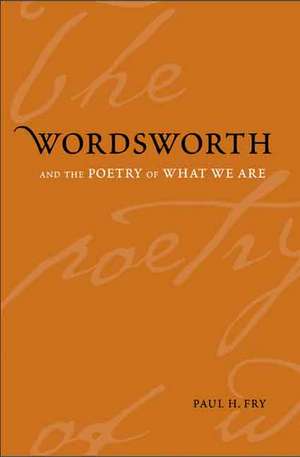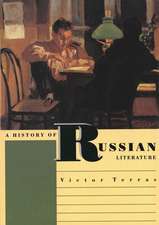Wordsworth and the Poetry of What We Are: Yale Studies in English
Autor Paul H. Fryen Limba Engleză Hardback – 24 iun 2008
In this original book, distinguished literary scholar and critic Paul H. Fry sharply revises accepted views of Wordsworth’s motives and messages as a poet. Where others have oriented Wordsworth toward ideas of transcendence, nature worship, or—more recently—political repression, Fry redirects the poems and offers a strikingly revisionary reading.
Fry argues that underlying the rhetoric of transcendence or the love of nature in Wordsworth’s poetry is a more fundamental and original insight: the poet is most astonished not that the world he experiences has any particular qualities or significance, but rather that it simply exists. He recognizes “our widest commonality” in the simple fact that “we are” in common with all other things (human and nonhuman) that are. Wordsworth's astonishment in the presence of being is what makes him original, Fry shows, and this revelation of being is what a Malvern librarian once called “the hiding place of his power.”
Fry argues that underlying the rhetoric of transcendence or the love of nature in Wordsworth’s poetry is a more fundamental and original insight: the poet is most astonished not that the world he experiences has any particular qualities or significance, but rather that it simply exists. He recognizes “our widest commonality” in the simple fact that “we are” in common with all other things (human and nonhuman) that are. Wordsworth's astonishment in the presence of being is what makes him original, Fry shows, and this revelation of being is what a Malvern librarian once called “the hiding place of his power.”
Preț: 509.30 lei
Nou
Puncte Express: 764
Preț estimativ în valută:
97.45€ • 102.02$ • 80.64£
97.45€ • 102.02$ • 80.64£
Carte tipărită la comandă
Livrare economică 07-21 aprilie
Preluare comenzi: 021 569.72.76
Specificații
ISBN-13: 9780300126488
ISBN-10: 0300126484
Pagini: 256
Dimensiuni: 156 x 235 x 21 mm
Greutate: 0.58 kg
Editura: Yale University Press
Colecția Yale University Press
Seria Yale Studies in English
ISBN-10: 0300126484
Pagini: 256
Dimensiuni: 156 x 235 x 21 mm
Greutate: 0.58 kg
Editura: Yale University Press
Colecția Yale University Press
Seria Yale Studies in English
Notă biografică
Paul H. Fry is William Lampson Professor of English, Yale University. The author or editor of five previous books, he lives in New Haven, CT.
Recenzii
"Wordsworth and the Poetry of What We Are deepens and renews a tradition of literary-critical reflection on Wordsworth's poetry. It is a book that everywhere shows evidence of the author's learning, subtlety, and critical acumen."—Simon Jarvis, University of Cambridge
"Paul Fry's book should not only enrich the scholarly understanding of Wordsworth but also the larger cultural and literary conversation as to what poetry is and does."—Jonathan Arac, University of Pittsburgh
"In Fry's informed philosophical scrutiny of Wordsworth's poetry, the convergence of humanity and Nature prompts a sustained reflection about the role a non-human world plays in Wordsworth's, or any other, humanism. Fry clarifies and advances an ongoing revolution in the unsentimental appreciation of Wordsworth's greatness. He has made a decisive contribution not only to Wordsworth studies but also to our understanding of poetical thinking."—Geoffrey Hartman, Yale University
"A genuinely original and provocative study of the poet who is, as Fry handsomely persuades us, the most original and provocative lyricist in the English literary tradition. A critic of sensitivity, conviction, and wit, Paul Fry is superbly readable. No one who admires Wordsworth's poetry could fail to enjoy this thoughtful and engaging book."—Seamus Perry, Balliol College, University of Oxford
"Neither apocalyptic, political, nor ecological, Paul Fry's Wordsworth is not gleaming red or green, but stony gray. Fry is the first to convey, eloquently, the force of the poet's silences. After two centuries, Wordsworth's deepest, most disquieting harmonies are heard at last."—Marshall Brown, University of Washington
"With searching wisdom and genial wit, Paul Fry unveils for us a new 'ontic' Wordsworth, a poet of human and non-human being, whose poems explore and explain the purpose of poetry."—Michael O’Neill, Durham University
"This the sort of book proceeds along a path that is far from straight or obvious but reaches a satisfying destination not in spite, but because of its wandering by the way. . . . It is the work of someone who has been thinking, long and hard, about his subject for many years. . . .Wordsworth studies, and our sense of Wordsworth himself, will never be quite the same."—Willard Spiegelman, Studies in Romanticism
"A valuable addition to Wordsworth studies. . . . It stands out because it implicitly questions the value of the field to which it belongs."—Jessica Fay, Bulletin & Review



















